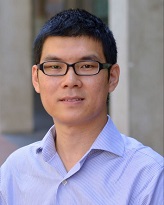Shaolei Ren
AI, systems, and society: Building a resilient, safe and healthy future.

E-mail: shaolei@ucr.edu
I am an Associate Professor of Electrical and Computer Engineering at the University of California, Riverside, where I am also a cooperating faculty member in the Computer Science and Engineering department. My research broadly focuses on AI, systems, and society, striving to build a resilient, safe and healthy future. Towards this goal, I study both algorithmic foundations and empirical methodologies, centered on:
-
Reliable AI-augmented decision making: Infusing domain knowledge to robustify machine learning predictions for reliable decision making in highly dynamic, uncertain, and/or adversarial environments (SIGMETRICS’25, SIGMETRICS’24, SIGMETRICS’22b, NeurIPS’25, NeurIPS’24a, NeurIPS’23a, NeurIPS’23b, ICML’23a, ICLR’24)
-
Health-informed AI: Quantifying and minimizing the public health impact of AI data centers and leveraing AI to improve public health (Harvard Business Review, IEEE Spectrum, Federation of American Scientists). More results will be posted soon!
-
Efficient AI and data centers: Developing principled methodologies to measure and minimize AI’s resource usage and lifecycle footprint (Communications of the ACM, e-Energy’24a, e-Energy’24b, ASPLOS’24, SIGMETRICS’22a, CPAL’25, DAC’22, tinyML’22, IEEE Spectrum, OECD AI)
-
Safe AI: Safeguarding AI from malicious and adversarial exploitation (NeurIPS’24b, ICLR’24, ICML’23b, ICCAD’22)
-
AI fairness: Building responsible AI to tackle societal challenges (ICML’24, Communications of the ACM, e-Energy’24c, Harvard Business Review)
I received the 2015 NSF CAREER award and paper awards from multiple conferences, including ACM e-Energy 2024 and 2016, the flagship conference of the ACM SIG on Energy Systems and Informatics. I have also writen semitechnical articles for multiple magzines and organizations such as Harvard Business Review (1, 2), IEEE Spectrum (1, 2), and OECD AI Policy Observatory (1, 2). Occasionally, I share my research findings on policy forums, public events and media, such as expert panels organized by US Government Accountability Office, UN Trade and Development, UN Environment Programme, MIT Technology Review, AP (1, 2), WSJ (1, 2, 3), Bloomberg (1, 2, 3), CNN (1, 2), NBC (1, 2), CNBC (1, 2), NPR (1, 2), and BBC (1, 2, 3). I was a speaker at TED AI.
to new students
Our group is looking for multiple PhD students (in ECE or CS) to work on exciting projects related to machine learning, optimization, efficient AI, or gigawatt-scale data centers. Students with interests in theory, algorithms, or empirical system building are welcome to contact: shaolei@ucr.edunews
recent highlights
- NeurIPS
- SIGMETRICS
- CACMCommunications of the ACM, 2025
- SIGMETRICS
- NeurIPS
- ICML
- CACM
- NeurIPS
- NeurIPS
- SIGMETRICS
education
University of California, Los Angeles
Ph.D. in Electrical Engineering
Advisor: Mihaela van der Schaar (now with the University of Cambridge)
The Hong Kong University of Science and Technology
M.Phil. in Electronic and Computer Engineering
Advisor: Khaled B. Letaief
Tsinghua University, Beijing, China
B.E. in Electronics and Information Engineering
employment
University of California, Riverside
Associate Professor of Electrical and Computer Engineering
Cooperating Faculty of Computer Science and Engineering
Assistant Professor of Electrical and Computer Engineering (07/2015--06/2019)
Florida International University
Assistant Professor of Computing and Information Sciences
professional services
I frequently serve on the technical program committee of ACM SIGMETRICS, ACM e-Energy, and major AI conferences such as NeurIPS and ICML. I am/was an associate editor of ACM Transactions on Modeling and Performance Evaluation of Computing Systems, IEEE Systems Journal, and IEEE Transactions on Green Communications and Networking. I have also served as a guest editor for special issues in IEEE Transactions on Sustainable Computing and Performance Evaluation.contact
Shaolei RenDepartment of Electrical and Computer Engineering
University of California, Riverside
Riverside, CA 92521, United States
Office: Winston Chung Hall 319
Phone: 951-827-2260
E-mail: shaolei@ucr.edu